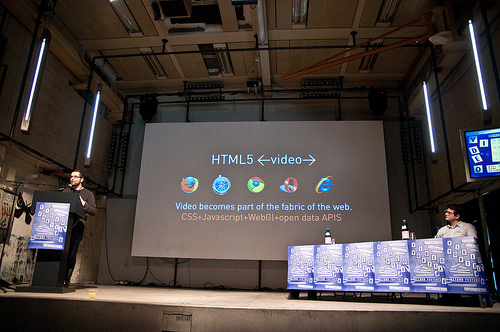By Serena Westra
The second speaker of the Platforms, Standards & the Trouble with Translation Civil Rights session is Ben Moskowitz. For the second time in a year, the first time was in November for the Ecommons conference, he came all the way from the USA to join us. Moskowitz works for the Mozilla Foundation and is an adjunct professor at NYU’s Interactive Telecommunications Program. He served as the director of the Open Video Conference and led the 2009-2010 iCommons video policy project.
He fills the room with enthusiasm as he starts speaking: ‘Hi, how are you all doing?’ He begins his presentation with a shocking statement for a conference about YouTube: ‘Web video isn’t real web video.’ But before the other speakers and the audience can start a protest, he starts explaining: it is not real web video because it is online video. There is a difference between both, in the sense that most web video on the Internet is ‘just TV pasted into a web page’. This might as well be a black box, according to Moskowitz, and is quite of the opposite of open source. The problem with this form of presenting web video, like YouTube and Vimeo, is that it is too static. You cannot even link to a video: you can only link to a page.
Moskowitz solution to this problem is HTML 5 video. With HTML 5 you can embed videos: ‘They become a part of the fabric of the web.’ You can create sematic connections and all kind of things you can’t simply do with flash. It will revolutionize storytelling in a way that is non-linear and points directly to other information, links, sources, maps, and so on.
Moskowitz and his team at Mozilla started a video lab, Web Made Movies, and tried to answer the question: ‘How can we use technologies and create new ways of engaging with people?’ In addition to this, they build with a group of volunteers and college students Popcorn.js, which uses the HTML 5 video framework. ‘Popcorn.js is an event framework for HTML5 that provides a simple API for synchronizing interactive and immersive content. Popcorn.js utilizes the native HTMLVideoElement properties, methods and events, normalizes them into an easy to learn API, and provides a plugin system for community contributed interactions’ (Popcorn.org). This open source software functions, in the words of Moskowitz, as a set of Lego’s for your web video’s. It is open source, so everyone is free to use it in his or her own way. They already have severall plugins for webservices and made a graphical user interface, called Butter.
As a demonstration of Popcorn.js, Moskowitz shows a video made by his cousin. She made a book report with the use of Popcorn. Not only do you see her report of the book in a small webcam video, Popcorn makes it also possible to show at the same time a map of the places discussed, several webpages and links, pictures and subtitles. You can even choose subtitles in another language by Google Translate. Compered to this, the book reports I used to make really look old fashion!
Another great example is rebelliouspixels.com. This website shows a video of Donald Duck, with the voice over of Glenn Beck. The uniqueness of this way of showing video on Internet is that you can exactly see at every point in the video what source has been used for the sound and image. And there is more: you can also read footnotes with background information and Wikipedia information about the subjects.
The last example Ben mentions is a video of a speech of Obama. At the bottom of the video is a tweet to time button, which shows the current time code. Click on the button and you generate a twitter time link, which links to the exact time of the video, so you don’t have to search in the video to the part you want to see yourself.

Ben Moskowitz - 'Video of the Open Web, Not Just on the Open Web'. Photo by Anne Helmond.
According to Ben, it is important to teach kids HTML. ‘One of the great things of the web is that you can hack it.’ It is important to view the source. Moskowitz and his team are working on a way to make it easier to understand how the Internet works. They want to ‘pull back the curtain’ and get people more involved in coding and being active. Mozilla, a global non-profit dedicated to putting you in control of your online experience and shaping the future of the Web for the public good, is putting a lot of effort in this. ‘It exist to promote openness, Fire fox is the main way we do this. It has really exceeded to open up the browser.’ The homepage of Mozilla says: ‘Mozilla is all about keeping the web open and free for everyone, everywhere. Our work is protecting the web from exploitation, centralization and control.’
As you can see, Ben Moskowitz and his team at Mozilla are doing a great job by keeping the web open and creating ‘real’ web video. If you want to see more of his projects, there will be a new Open Video Conference soon. Unfortunately he could not tell us yet when, but we’ll wait and see!



